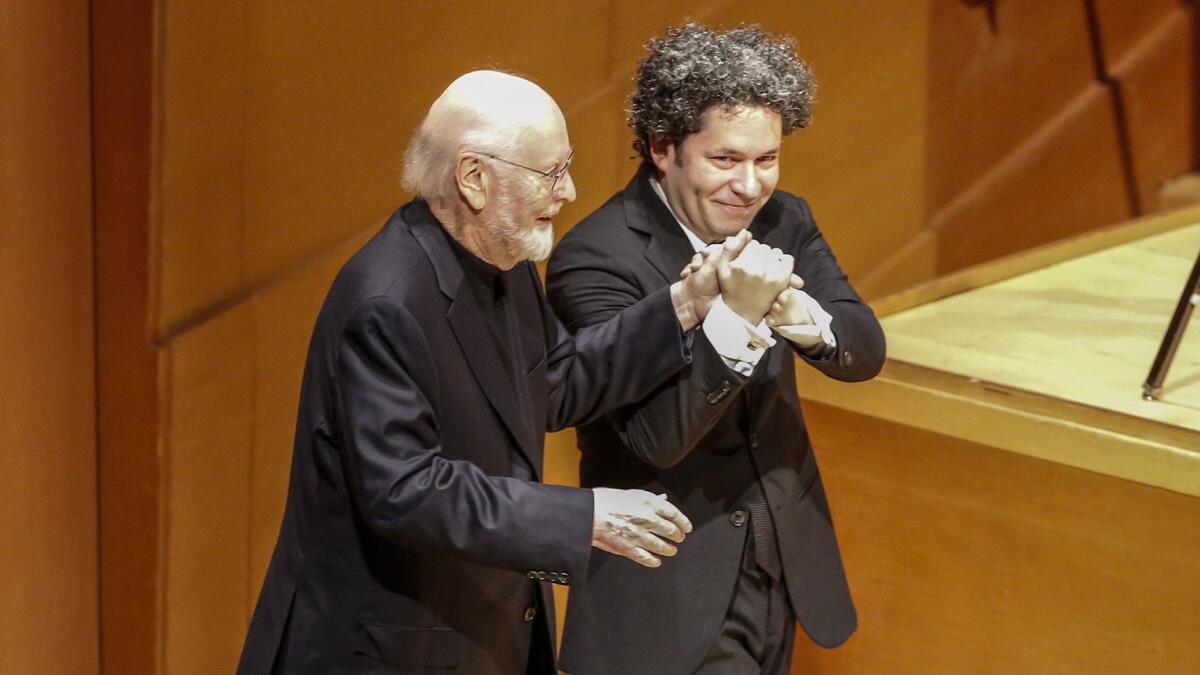Review: Why Dudamel conducting John Williams’ music in Disney Hall is unlike any Williams music you’ve heard before

- Share via
There can be no real statistics to back up any of this, but it is surely obvious that John Williams has written by a long shot the most widely heard orchestral music of our time. How could it be otherwise with his scores that have all but defined blockbuster after blockbuster, decade after decade?
Certainly no living composer has had more orchestral concerts devoted entirely to his music. At 86, Williams himself may have lost count of his honors, to say nothing of his 51 Academy Award nominations, five Oscars, 23 Grammys and all the rest.
Is he the most popular film composer of all time? No question. Is he the most popular composer alive, period? Can you think of anyone other than the dean, king and, for some, deity of musical Hollywood?
All of this is to say that it takes a lot to make a John Williams tribute stand out. Again, I can’t prove it, but there could be little question that Gustavo Dudamel’s Los Angeles Philharmonic celebration of Williams at Walt Disney Concert Hall on Thursday was the greatest.
The program itself was like most, sticking mostly to Williams’ hit scores — “Star Wars,” the Indiana Jones and Harry Potter movies, “Jaws,” “Close Encounters of the Third Kind,” “E.T. the Extra-Terrestrial,” etc. — along with the fanfare and theme that he wrote for the 1984 Los Angeles Olympic Games and that has been the motto of Olympics telecasts ever since. All of this left but one remaining question: Which theme would infect you with an earworm the next morning? I happened to catch the Indiana Jones bug.
The orchestra was large and the playing, spectacular. That too was expected. The L.A. Phil is Williams’ hometown band. The players all know him. He’s written music for them, conducted them regularly. Some record on the studio sound stages with him. He’s been close to several of the orchestra’s music directors.
But Dudamel is different, and so was this tribute. Dudamel brought out a sonic grandeur that I’m willing to wager went beyond all that has, Williams-wise, come before. The difference between hearing “Stars Wars” in a Dolby-inundated movie theater, or on TV, or (heaven forbid) on your phone, or in Disney Hall is as great as skimming through amateur Instagram nature photos and actually being in the woods.
But something else was at the heart of the program, which continues through Sunday and is being recorded live for release in a month or two on Deutsche Grammophon.
Williams has a magical sense of writing music that sends a message — a message of hope and glory and wonder and joy. This resounds especially well in children and makes them identify with Luke Skywalker, with Harry Potter, with the children in “E.T.” and “Close Encounters,” with a world that is wide and full of possibilities. As Dudamel noted on Hollywood Boulevard on Tuesday morning at the unveiling of his star on the Walk of Fame, he was one of those kids growing up in Barquisimeto who was besotted by the movies, particularly the Steven Spielberg and George Lucas epics with Williams soundtracks.
“Wow,” Dudamel said, after having been introduced by — you guessed it, Williams — at the ceremony. “Magic does happen in Hollywood.”
“Who could imagine,” he went on to say, that someone “whose only marketable skill is waving a stick in the air could be standing here today?”
Two nights later at Disney Hall, the message these scores sent him in Barquisimeto had become messages he was now sending back to Venezuela on a day of the country’s massive demonstrations, the failing country taking to the streets in hopes of achieving regime change. “I’m with you,” Dudamel said Tuesday of what he insisted must be peaceful demonstrations.
What Dudamel evoked in his Thursday tribute was a Williams world where good triumphs over bad, where vistas open and where sounds produce enchantment.
And so Williams’ great fanfares and ceremonial marches, like the Imperial March from “The Empire Strikes Back” and the Olympics music, resounded with new purpose. That’s probably why the march from “Raiders of the Lost Ark” stuck so persistently.
Dudamel made Williams’ love music especially rhapsodic, as love in the time of war tends to be, and as Sayuri’s Theme from “Memoirs of a Geisha” was in particular, thanks to principal cellist Robert deMaine’s solo. Meanwhile, in the most serious selection of the evening, the young violinist Simone Porter brought a soulful dark richness to the main theme from “Schindler’s List.”
But what made this the most memorable and meaningful of Williams’ tributes was Dudamel’s message of responsibility. He paid attention to detail, such as in the inner sonic and surprising harmonic experiments in “Close Encounters” and the equally surprising Bartók-ian counterpoint in, of all things, the “Shark Cage” fugue from “Jaws.”
Through all this was a continual emphasis on Williams’ capacity for musical transformation. His ways of developing his themes may be his greatest gift, finding ever more value in presenting a character or situation in a new light. It is this that most humanizes so many of the films he’s scored, that makes music a symbol of hope.
That is why Williams’ music can make you feel a little bit better than you did before. That is also why one synonym for transformation happens to be, and seemed necessarily so in Dudamel’s John Williams performances at this crucial historical moment, revolution.
‘Celebrating John Williams’
When: 8 p.m. Friday-Saturday, 2 p.m. Sunday
Where: Walt Disney Concert Hall, 111 S. Grand Ave., L.A.
Tickets: $97-$254
Info: laphil.com
More to Read
The biggest entertainment stories
Get our big stories about Hollywood, film, television, music, arts, culture and more right in your inbox as soon as they publish.
You may occasionally receive promotional content from the Los Angeles Times.











